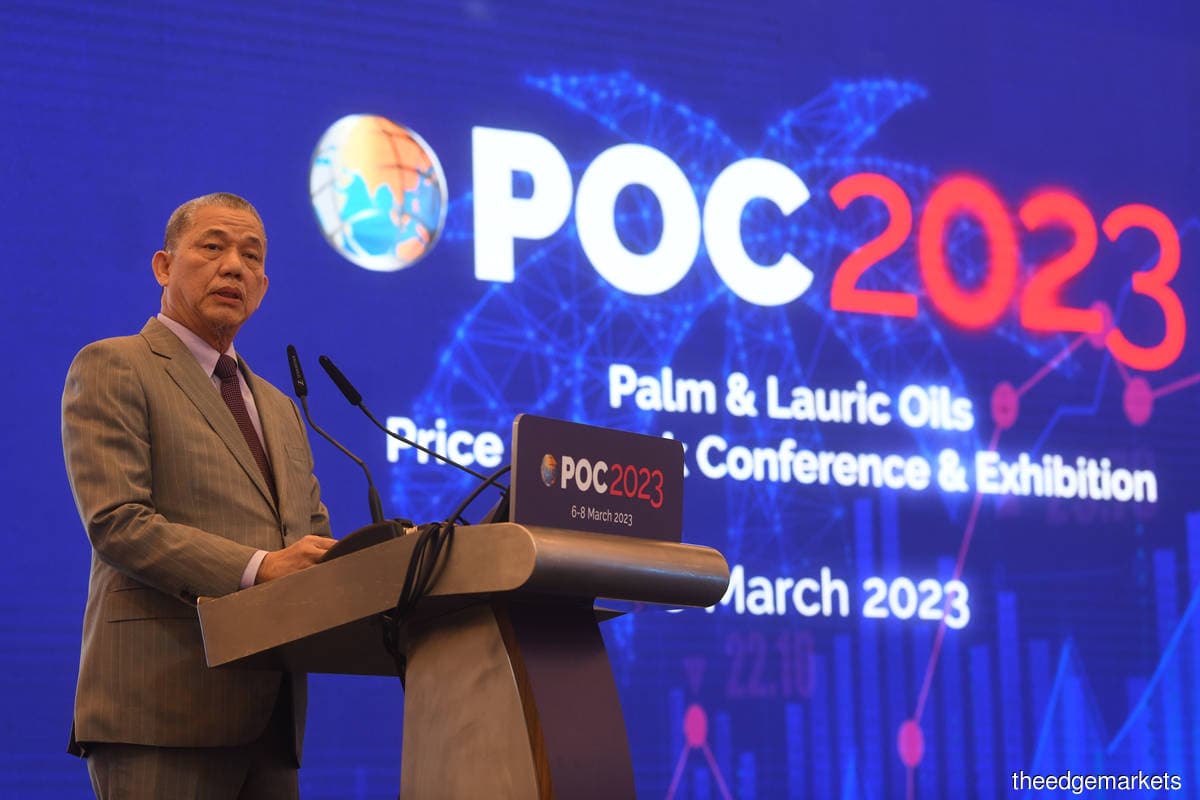
KUALA LUMPUR (March 7): The implementation of the European Deforestation-free Regulation (EUDR) is expected to reduce palm oil exports to the European Union.
Deputy Prime Minister and Plantation and Commodities Minister Datuk Seri Fadillah Yusof said the EUDR was introduced by the EU in November 2021 as part of the its Green Deal, to limit deforestation caused by the consumption of agricultural commodities and products from around the world.
It listed palm oil as one of the commodities that drive forest degradation through the expansion of agricultural land.
The EU bloc imported a total of 1.47 million metric tonnes of Malaysian palm oil in 2022, with an export value of RM8 billion. However, the import recorded a 10.5% decline compared to the same period of 2021.
“As a result, the implementation of EUDR is expected to significantly impact the use of palm oil in the EU, and create a negative image of Malaysian palm oil, which will lead to a reduction in exports to the EU and possibly globally.
“Needless to say, we are not taking the issue lightly, and the government and industry are working hand in hand to counter this negative campaign and unfair narrative, which we view as nothing less than an attempt at creating another trade barrier for palm oil,” the minister said in his keynote address at the 34th Palm & Lauric Oils Price Outlook Conference & Exhibition (POC2023) on Tuesday (March 7).
Palm oil targeted despite more efficient land use compared with other edible oil crops
The EUDR, which is expected to be implemented this year by the EU, has so far included palm oil and soy in its list of commodities linked with deforestation and forest degradation. Other commodities that were targeted include cocoa, cattle and timber.
The deforestation regulation would require companies to produce a due diligence report with "verifiable" information that they were not grown on land deforested after 2020.
However, sunflower and rapeseed were noticeably absent from the EUDR list, leading to some palm oil industry participants arguing that this was a form of non-tariff barrier and discrimination imposed by the EU.
According to research published by the Malaysian Palm Oil Council (MPOC), oil palm is the most efficient oil-bearing crop in the world, requiring only 0.26 hectares of land to produce one tonne of oil.
In contrast, soybean, sunflower and rapeseed would require 2.22, 2, and 1.52 hectares, respectively, to produce the same amount of oil, which indicates replacing palm oil with other crops could further accelerate deforestation.
“The palm oil industry has met its fair share of sceptics and debates,” the minister said at the conference.
He had previously criticised the regulation as a deliberate act by the EU to block market access for Malaysia and to protect the EU's domestic oilseeds market which is inefficient and cannot compete with the cost of palm oil.
He added Malaysia has joined forces with other palm oil producing countries to ensure that its palm oil is not grossly misrepresented.
Malaysia and Indonesia, which together account for 80% of the world’s palm oil production, have been at loggerheads with international NGOs and the EU over palm oil production practices due to concerns over deforestation.
“That said, the Malaysia palm oil industry must continue its ongoing efforts in ensuring that palm oil production does not negatively impact environmental well-being. It is important for palm oil producing nations to highlight the measures we have taken in order to achieve that goal,” he added.
He urged the Malaysian palm oil industry participants to continue to produce sustainable palm oil to meet the world's stringent demands.
As of Jan 31, 97% of oil palm planted areas and more than 98% of palm oil mills in Malaysia have been MSPO certified.
In 2022, Malaysia produced 18.45 million metric tonnes of crude palm oil, an increase of 1.9% from 2021 at 18.12 million metric tonnes.
The total revenue of palm oil and other palm-based products in 2022 stood at RM135 billion, higher by 24.4% as compared to RM108.52 billion in 2021 due to higher export prices in 2022.
Read also:
Fadillah: National Biomass Action Plan to be completed in July
Market participants must be prepared to capitalise on price volatility — Bursa chairman
Sime Darby Plantation aims to have 100% local workers in its estates by end-2027
More stringent management could yield palm oil companies 10% more, says KLK CEO
FGV calls for consolidation of smallholders from Felda, Felcra and Risda for sustainable palm oil production